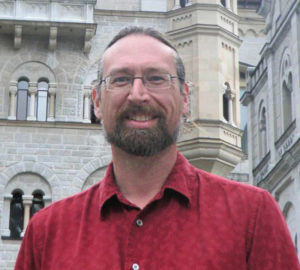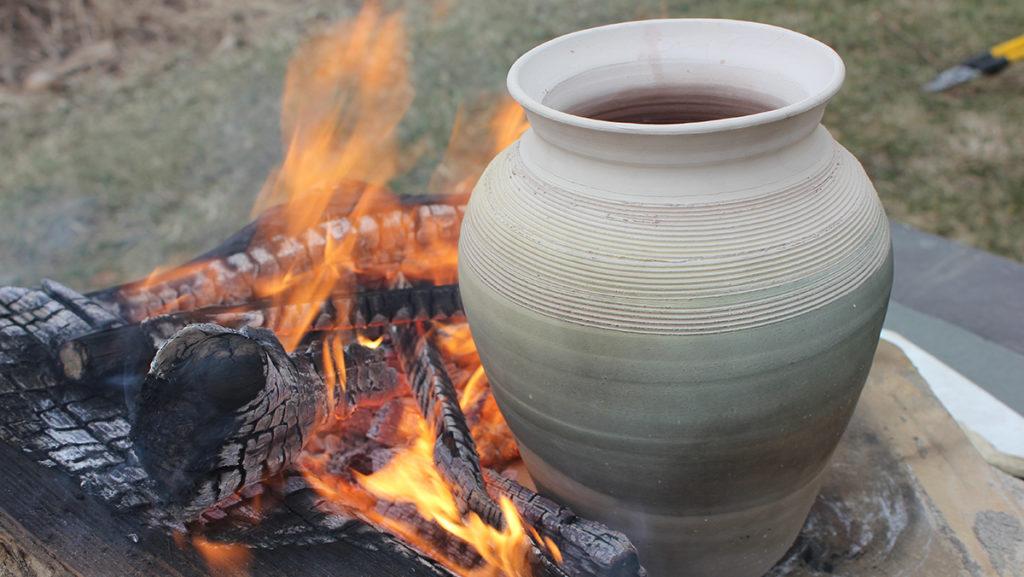Sitting by an outdoor fire in his backyard, Scott Stull, assistant professor in the Department of Anthropology, keeps watch over a pot with ingredients in it. He rotates the cauldron to avoid forming cracks and slowly pushes it closer to the heated coals. When the cauldron reaches the desired temperature, Stull places chicken, gravy and spices in the pot to create a traditional medieval dish called winter potage from a recipe book from the late 14th century.

Stull has been creating small-scale replications of medieval food for more than 25 years. He said he makes the food for himself, his family, his friends and for certain classes he teaches. While Stull specializes in food from the Middle Ages, he has also cooked dishes from other periods too, such as the Neolithic period.
Stull, who has lived on an organic vegetable farm in Ithaca with his family for the past 30 years, said he has always been interested in food and agriculture. Recreating food, he said, allows the cook to understand someone from that period.
“The process of making food teaches you about medieval culture in a way that you can’t get otherwise,” he said.
More recently, Stull has developed more active research projects that have led him to present at conferences such as the Reconstructive and Experimental Archaeology Conference in Williamsburg, Virginia.
One of the research projects Stull is working on is using food replication, especially medieval food, in the classroom as a teaching tool. He said studying the ways medieval recipes use methods of measuring cooking time, such as walking half a mile or saying a certain number of prayers, gives insight into the culture.
“It’s a way to get precision when you don’t have a clock to do it,” Stull said. “That tells us something about what it means to live in the Middle Ages.”
Freshman Zoe Merod, a student in Stull’s medieval archaeology seminar, is working with Stull to recreate dishes in a medieval cookbook to understand why certain cooking vessels were used to cook certain foods. In the past, Merod conducted an independent study project where she cooked a medieval feast for her high school class.
While Merod’s project is one outside the classroom, Stull said he always incorporates food into his classes because it is a part of human culture. In his medieval archaeology seminar, which has 10 students this semester, Stull asks his students to make or buy some kind of food that would have been served in the Middle Ages. As the only professor to teach the course for the past 10 years at the college, Stull said he conducts the class about every other year. He said this project usually gets positive responses from the students because they can learn from an experience rather than a book.
“You go to the library; you can read all you want about medieval subsistence patterns,” Stull said. “But until you go and actually see what it’s like to have this food, you have no idea what it’s actually like … and it’s a transformative learning experience.”
Merod said her class with Stull has given more structure to her interests in medieval food and that she has received a good foundation for future studies. She also said Stull has shown her all the different possibilities of being a medieval scholar.
“You can be a medievalist personally or can be a medievalist outwardly and show your passions through teaching or going to conferences, but you can also just like it, and that’s good enough too,” she said.
Maureen Costura, associate professor at the Culinary Institute of America, said she knows Stull from the archaeological community in Ithaca when she was receiving her doctorate at Cornell University. Costura also shares an interest in constructing medieval food dishes, and she incorporates anthropology and food into her classes. She said food offers insight into the cultures of the past.
“By understanding the ways people in the past ate and the technologies they used and the advances they made, you can understand a lot about what that culture valued,” Costura said.
Regarding his focus area, Stull said there are not many people who study the historical anthropology of food, but he said drawing from different people and sources keeps his studies engaging.
“I’m in this sort of interesting place where I talk to the culinary historians, and I talk to the re-enactors, and I talk to the anthropologists who study other time periods,” he said. “A lot of experimental archaeologists do things with food and food preparation, but they tend to look at much older periods. My spot is sort of in-between, but I get to draw from all these different researchers, which is fun for me but a little bit of a challenge.”














